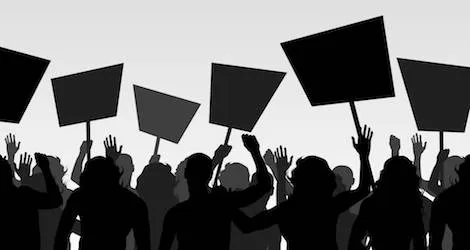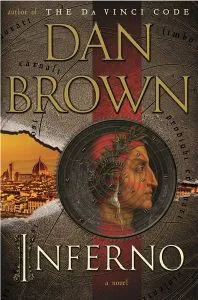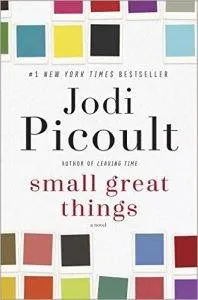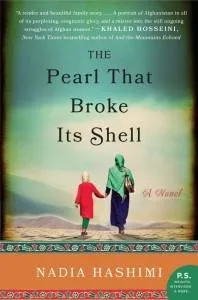
Social Activism Through Books
This content contains affiliate links. When you buy through these links, we may earn an affiliate commission.
I have a theory: bookworms make the best social activists. And it’s not just because reading is knowledge. For me, the practice of reading fiction helps build socially conscious, empathetic global citizens. With an important distinction: fiction-readers, unlike their news junkie counterparts, typically don’t become jaded. After all, social issues as portrayed in (good) fiction are contextualized by layered, detailed characters who depict the human condition in a way that is both relatable and unreal – and that specific combination has the power of allowing us to open our hearts to a cause in a compassionate, yet not tortuously all-consuming way.
With that in mind, it’s time to play Match Three Modern-day Issues with a Favorite Work of Fiction. (What? You’ve never heard of this game?) Because nonfiction isn’t the only way of learning about our planet’s contemporary problems.
 The books: Inferno by Dan Brown and Freedom by Jonathan Franzen
The issue: Human overpopulation
Let me begin by issuing a much needed mea culpa: I am the happiest when my friends have children. Kids are the best – cute, curious, and candid. But, sadly, there are too many of them (kids) in this planet, too many of us (humans). Don’t be fooled by the refreshing, yet utterly fallacious articles claiming that overpopulation isn’t an issue, or that, if it is, it’ll be fixed on its own without any major costs to Earth. It is an issue. In fact, it is arguably The Issue.
The books: Inferno by Dan Brown and Freedom by Jonathan Franzen
The issue: Human overpopulation
Let me begin by issuing a much needed mea culpa: I am the happiest when my friends have children. Kids are the best – cute, curious, and candid. But, sadly, there are too many of them (kids) in this planet, too many of us (humans). Don’t be fooled by the refreshing, yet utterly fallacious articles claiming that overpopulation isn’t an issue, or that, if it is, it’ll be fixed on its own without any major costs to Earth. It is an issue. In fact, it is arguably The Issue.
 Human overpopulation is behind global warming, environmental pollution, habitat loss, species extinction, among countless other pressing problems. Regardless of your position on this particular malady – whether you’re VHEMT, a technological optimist, a naturalist, a Malthusian realist, or anything in between – it might be interesting to read a little fiction that is both educational and entertaining.
If you’re in the mood for a thrilling page-turner, your best bet would be Dan Brown’s book, but if you’re in the mood for a thought provoking, delectable read, then I highly recommend Franzen’s masterpiece of a novel.
P.S. Regarding Inferno: Yes, it was made into a movie, but – shocker! – the book is better. Especially when it comes to shedding light on the overpopulation issue. And not just because they changed the ending when they made the movie.
Human overpopulation is behind global warming, environmental pollution, habitat loss, species extinction, among countless other pressing problems. Regardless of your position on this particular malady – whether you’re VHEMT, a technological optimist, a naturalist, a Malthusian realist, or anything in between – it might be interesting to read a little fiction that is both educational and entertaining.
If you’re in the mood for a thrilling page-turner, your best bet would be Dan Brown’s book, but if you’re in the mood for a thought provoking, delectable read, then I highly recommend Franzen’s masterpiece of a novel.
P.S. Regarding Inferno: Yes, it was made into a movie, but – shocker! – the book is better. Especially when it comes to shedding light on the overpopulation issue. And not just because they changed the ending when they made the movie.
 The book: Small Great Things by Jodi Picoult
The issue: Racism
I was born in a country filled with people who love to thump their own chest and say, “There is no racism in Brazil!” Indeed, I’ve heard many educated, articulate, patriotic individuals defend this atrocious eidolon by pointing out that, unlike the USA, Brazil never had legislated racism (think Jim Crow laws).
The reality (and, yes, it is a reality, as facts are not opinions) is that racism isn’t just alive in Brazil. It’s thriving. As it is in the USA, Canada, and other countries in the world. I once had a black student from the Netherlands tell me that his country, too, has serious racism problems. Racism is an issue – and yet so many think that it’s “so much better nowadays” or “on the decline” or – and this might be the most common chicanery – “it’s mostly unconscious racism at this day and age”.
To all these people: no. Hell, no.
And if you don’t believe me, try reading Picoult’s novel. It is an ambitious one: a white, privileged author writing from the point of view of a (too) well-intentioned, white public defender, an African American nurse, and a white supremacist. The result is a novel that tackles contemporary social issues, not just of race, but of self-identity and the perception of racial authenticity. Bonus: it’s also a gripping courtroom drama.
The book: Small Great Things by Jodi Picoult
The issue: Racism
I was born in a country filled with people who love to thump their own chest and say, “There is no racism in Brazil!” Indeed, I’ve heard many educated, articulate, patriotic individuals defend this atrocious eidolon by pointing out that, unlike the USA, Brazil never had legislated racism (think Jim Crow laws).
The reality (and, yes, it is a reality, as facts are not opinions) is that racism isn’t just alive in Brazil. It’s thriving. As it is in the USA, Canada, and other countries in the world. I once had a black student from the Netherlands tell me that his country, too, has serious racism problems. Racism is an issue – and yet so many think that it’s “so much better nowadays” or “on the decline” or – and this might be the most common chicanery – “it’s mostly unconscious racism at this day and age”.
To all these people: no. Hell, no.
And if you don’t believe me, try reading Picoult’s novel. It is an ambitious one: a white, privileged author writing from the point of view of a (too) well-intentioned, white public defender, an African American nurse, and a white supremacist. The result is a novel that tackles contemporary social issues, not just of race, but of self-identity and the perception of racial authenticity. Bonus: it’s also a gripping courtroom drama.
 The book: The Pearl that Broke its Shell by Nadia Hashimi
The issue: Sexism/Gender Equality
If you had to guess, how many expecting women would you say wish for a baby boy, and not a girl? How many fathers would prefer sons and not daughters? How many same-sex couples, solo parents, adopters, would prefer baby boys to baby girls?
While I’m sure you know of those who are looking forward to having a girl – might, in fact, prefer a girl – statistics indicate that baby boys are still more desirable than baby girls. Even among highly educated people living in democratic, free countries (countries where there is no legal difference between a boy and a girl, meaning that a girl can still inherit and own property, manage a business, etc.), many still prefer boys.
Sexism – prejudice, stereotyping, or discriminating on the basis of sex – continues to be a problem in every layer of society, in every corner of the globe. And while myriad examples of its perverse effects exist, how many of you have heard of parents turning a girl into a boy, so that they can have a son?
That is what happens in Hashimi’s novel: Rahima becomes Rahim, a bacha posh, a cultural practice in parts of Afghanistan and Pakistan, in which some families without sons pick a daughter to live and behave as a boy.
When my book club first picked this book (shout out to the Girly Book Club, especially Sarah Wreford, our amazing Toronto host!), I thought, “Well, this is… exotic.” Without meaning to, I separated myself from this novel’s premise, from its core issue. Yes, I am woman. But I was born in the western world, where such a practice would never happen. Right? Wrong.
The tradition of a bacha posh might not exist, but the clear preference for a son does. In fact, one of my closest male friends confessed to feeling relieved when he found out that his wife was pregnant with a boy, “Like it or not, the world is a sexist place. My child will have an easier life than he’d ever have if he were a girl.” It wasn’t pleasing to hear. But he isn’t wrong. Hashimi’s masterfully crafted characters’ struggles will be more relatable and familiar than most of us would care to admit.
I’d love to hear your thoughts on works of fiction that can help build empathy and shed light on a social cause. Please share!
The book: The Pearl that Broke its Shell by Nadia Hashimi
The issue: Sexism/Gender Equality
If you had to guess, how many expecting women would you say wish for a baby boy, and not a girl? How many fathers would prefer sons and not daughters? How many same-sex couples, solo parents, adopters, would prefer baby boys to baby girls?
While I’m sure you know of those who are looking forward to having a girl – might, in fact, prefer a girl – statistics indicate that baby boys are still more desirable than baby girls. Even among highly educated people living in democratic, free countries (countries where there is no legal difference between a boy and a girl, meaning that a girl can still inherit and own property, manage a business, etc.), many still prefer boys.
Sexism – prejudice, stereotyping, or discriminating on the basis of sex – continues to be a problem in every layer of society, in every corner of the globe. And while myriad examples of its perverse effects exist, how many of you have heard of parents turning a girl into a boy, so that they can have a son?
That is what happens in Hashimi’s novel: Rahima becomes Rahim, a bacha posh, a cultural practice in parts of Afghanistan and Pakistan, in which some families without sons pick a daughter to live and behave as a boy.
When my book club first picked this book (shout out to the Girly Book Club, especially Sarah Wreford, our amazing Toronto host!), I thought, “Well, this is… exotic.” Without meaning to, I separated myself from this novel’s premise, from its core issue. Yes, I am woman. But I was born in the western world, where such a practice would never happen. Right? Wrong.
The tradition of a bacha posh might not exist, but the clear preference for a son does. In fact, one of my closest male friends confessed to feeling relieved when he found out that his wife was pregnant with a boy, “Like it or not, the world is a sexist place. My child will have an easier life than he’d ever have if he were a girl.” It wasn’t pleasing to hear. But he isn’t wrong. Hashimi’s masterfully crafted characters’ struggles will be more relatable and familiar than most of us would care to admit.
I’d love to hear your thoughts on works of fiction that can help build empathy and shed light on a social cause. Please share!
 The books: Inferno by Dan Brown and Freedom by Jonathan Franzen
The issue: Human overpopulation
Let me begin by issuing a much needed mea culpa: I am the happiest when my friends have children. Kids are the best – cute, curious, and candid. But, sadly, there are too many of them (kids) in this planet, too many of us (humans). Don’t be fooled by the refreshing, yet utterly fallacious articles claiming that overpopulation isn’t an issue, or that, if it is, it’ll be fixed on its own without any major costs to Earth. It is an issue. In fact, it is arguably The Issue.
The books: Inferno by Dan Brown and Freedom by Jonathan Franzen
The issue: Human overpopulation
Let me begin by issuing a much needed mea culpa: I am the happiest when my friends have children. Kids are the best – cute, curious, and candid. But, sadly, there are too many of them (kids) in this planet, too many of us (humans). Don’t be fooled by the refreshing, yet utterly fallacious articles claiming that overpopulation isn’t an issue, or that, if it is, it’ll be fixed on its own without any major costs to Earth. It is an issue. In fact, it is arguably The Issue.
 Human overpopulation is behind global warming, environmental pollution, habitat loss, species extinction, among countless other pressing problems. Regardless of your position on this particular malady – whether you’re VHEMT, a technological optimist, a naturalist, a Malthusian realist, or anything in between – it might be interesting to read a little fiction that is both educational and entertaining.
If you’re in the mood for a thrilling page-turner, your best bet would be Dan Brown’s book, but if you’re in the mood for a thought provoking, delectable read, then I highly recommend Franzen’s masterpiece of a novel.
P.S. Regarding Inferno: Yes, it was made into a movie, but – shocker! – the book is better. Especially when it comes to shedding light on the overpopulation issue. And not just because they changed the ending when they made the movie.
Human overpopulation is behind global warming, environmental pollution, habitat loss, species extinction, among countless other pressing problems. Regardless of your position on this particular malady – whether you’re VHEMT, a technological optimist, a naturalist, a Malthusian realist, or anything in between – it might be interesting to read a little fiction that is both educational and entertaining.
If you’re in the mood for a thrilling page-turner, your best bet would be Dan Brown’s book, but if you’re in the mood for a thought provoking, delectable read, then I highly recommend Franzen’s masterpiece of a novel.
P.S. Regarding Inferno: Yes, it was made into a movie, but – shocker! – the book is better. Especially when it comes to shedding light on the overpopulation issue. And not just because they changed the ending when they made the movie.
 The book: Small Great Things by Jodi Picoult
The issue: Racism
I was born in a country filled with people who love to thump their own chest and say, “There is no racism in Brazil!” Indeed, I’ve heard many educated, articulate, patriotic individuals defend this atrocious eidolon by pointing out that, unlike the USA, Brazil never had legislated racism (think Jim Crow laws).
The reality (and, yes, it is a reality, as facts are not opinions) is that racism isn’t just alive in Brazil. It’s thriving. As it is in the USA, Canada, and other countries in the world. I once had a black student from the Netherlands tell me that his country, too, has serious racism problems. Racism is an issue – and yet so many think that it’s “so much better nowadays” or “on the decline” or – and this might be the most common chicanery – “it’s mostly unconscious racism at this day and age”.
To all these people: no. Hell, no.
And if you don’t believe me, try reading Picoult’s novel. It is an ambitious one: a white, privileged author writing from the point of view of a (too) well-intentioned, white public defender, an African American nurse, and a white supremacist. The result is a novel that tackles contemporary social issues, not just of race, but of self-identity and the perception of racial authenticity. Bonus: it’s also a gripping courtroom drama.
The book: Small Great Things by Jodi Picoult
The issue: Racism
I was born in a country filled with people who love to thump their own chest and say, “There is no racism in Brazil!” Indeed, I’ve heard many educated, articulate, patriotic individuals defend this atrocious eidolon by pointing out that, unlike the USA, Brazil never had legislated racism (think Jim Crow laws).
The reality (and, yes, it is a reality, as facts are not opinions) is that racism isn’t just alive in Brazil. It’s thriving. As it is in the USA, Canada, and other countries in the world. I once had a black student from the Netherlands tell me that his country, too, has serious racism problems. Racism is an issue – and yet so many think that it’s “so much better nowadays” or “on the decline” or – and this might be the most common chicanery – “it’s mostly unconscious racism at this day and age”.
To all these people: no. Hell, no.
And if you don’t believe me, try reading Picoult’s novel. It is an ambitious one: a white, privileged author writing from the point of view of a (too) well-intentioned, white public defender, an African American nurse, and a white supremacist. The result is a novel that tackles contemporary social issues, not just of race, but of self-identity and the perception of racial authenticity. Bonus: it’s also a gripping courtroom drama.
 The book: The Pearl that Broke its Shell by Nadia Hashimi
The issue: Sexism/Gender Equality
If you had to guess, how many expecting women would you say wish for a baby boy, and not a girl? How many fathers would prefer sons and not daughters? How many same-sex couples, solo parents, adopters, would prefer baby boys to baby girls?
While I’m sure you know of those who are looking forward to having a girl – might, in fact, prefer a girl – statistics indicate that baby boys are still more desirable than baby girls. Even among highly educated people living in democratic, free countries (countries where there is no legal difference between a boy and a girl, meaning that a girl can still inherit and own property, manage a business, etc.), many still prefer boys.
Sexism – prejudice, stereotyping, or discriminating on the basis of sex – continues to be a problem in every layer of society, in every corner of the globe. And while myriad examples of its perverse effects exist, how many of you have heard of parents turning a girl into a boy, so that they can have a son?
That is what happens in Hashimi’s novel: Rahima becomes Rahim, a bacha posh, a cultural practice in parts of Afghanistan and Pakistan, in which some families without sons pick a daughter to live and behave as a boy.
When my book club first picked this book (shout out to the Girly Book Club, especially Sarah Wreford, our amazing Toronto host!), I thought, “Well, this is… exotic.” Without meaning to, I separated myself from this novel’s premise, from its core issue. Yes, I am woman. But I was born in the western world, where such a practice would never happen. Right? Wrong.
The tradition of a bacha posh might not exist, but the clear preference for a son does. In fact, one of my closest male friends confessed to feeling relieved when he found out that his wife was pregnant with a boy, “Like it or not, the world is a sexist place. My child will have an easier life than he’d ever have if he were a girl.” It wasn’t pleasing to hear. But he isn’t wrong. Hashimi’s masterfully crafted characters’ struggles will be more relatable and familiar than most of us would care to admit.
I’d love to hear your thoughts on works of fiction that can help build empathy and shed light on a social cause. Please share!
The book: The Pearl that Broke its Shell by Nadia Hashimi
The issue: Sexism/Gender Equality
If you had to guess, how many expecting women would you say wish for a baby boy, and not a girl? How many fathers would prefer sons and not daughters? How many same-sex couples, solo parents, adopters, would prefer baby boys to baby girls?
While I’m sure you know of those who are looking forward to having a girl – might, in fact, prefer a girl – statistics indicate that baby boys are still more desirable than baby girls. Even among highly educated people living in democratic, free countries (countries where there is no legal difference between a boy and a girl, meaning that a girl can still inherit and own property, manage a business, etc.), many still prefer boys.
Sexism – prejudice, stereotyping, or discriminating on the basis of sex – continues to be a problem in every layer of society, in every corner of the globe. And while myriad examples of its perverse effects exist, how many of you have heard of parents turning a girl into a boy, so that they can have a son?
That is what happens in Hashimi’s novel: Rahima becomes Rahim, a bacha posh, a cultural practice in parts of Afghanistan and Pakistan, in which some families without sons pick a daughter to live and behave as a boy.
When my book club first picked this book (shout out to the Girly Book Club, especially Sarah Wreford, our amazing Toronto host!), I thought, “Well, this is… exotic.” Without meaning to, I separated myself from this novel’s premise, from its core issue. Yes, I am woman. But I was born in the western world, where such a practice would never happen. Right? Wrong.
The tradition of a bacha posh might not exist, but the clear preference for a son does. In fact, one of my closest male friends confessed to feeling relieved when he found out that his wife was pregnant with a boy, “Like it or not, the world is a sexist place. My child will have an easier life than he’d ever have if he were a girl.” It wasn’t pleasing to hear. But he isn’t wrong. Hashimi’s masterfully crafted characters’ struggles will be more relatable and familiar than most of us would care to admit.
I’d love to hear your thoughts on works of fiction that can help build empathy and shed light on a social cause. Please share!











